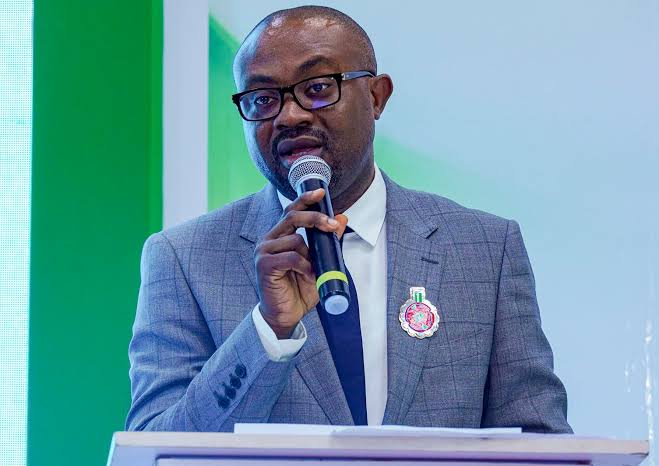By Ibironke Ariyo
The Minister of Interior, Dr Olubunmi Tunji-Ojo, has charged senior officers of the four Paramilitary agencies under the Ministry to embrace efficiency, innovation and continuous learning as critical requirements for career progression in public service.
Tunji-Ojo gave the charge during the opening of the capacity building programme on Performance Management System for personnel of the four agencies on Monday in Abuja.
The News Agency of Nigeria(NAN), reports that the four Paramilitary agencies are Nigeria Immigration Service (NIS), Nigeria Security and Civil Defence Corps (NSCDC), Nigerian Correctional Service (NCoS) and Federal Fire Service (FFS).
The Minister emphasised that the training was designed to strengthen their capacity to solve modern security and administrative challenges.
He noted that the nature of national problems had changed, requiring new approaches, thinking and solutions, and warned that performance and efficiency, not just years of service, would determine promotion going forward.
“For me, I have read my Bible from Genesis to Revelation and I know the only thing recorded about Methuselah was that he lived 969 years.
“David lived 70 years and Solomon lived less than that, yet we still talk about them. Longevity is not the criteria anymore, performance and efficiency are,” he said.
The minister urged officers to build strong work ethics like he did in private practice, which he said prepared him for public office saying “the way you handle government job is the way you will end up becoming.”
Tunji-Ojo stressed that capacity building investments were not only for the government’s benefit but for officers’ personal growth after retirement.
He, however, added that some participants would still play roles in official or private capacities long after leaving service.
He encouraged officers to take initiative, conduct personal research, adopt technology and present new ideas to their management instead of relying on outdated manuals and procedures.
“We are amplifying your efficiency and suppressing deficiencies. Gone are the days when seniority alone was the criteria for growth.
“What you don’t think about, you cannot execute. Innovation is a function of research. When was the last time you updated yourself?
“When was the last time you brought forward-thinking ideas to move your service forward?” he asked.
Tunji-Ojo disclosed plans to reintroduce a reward system for creative and hardworking officers, and urged heads of services to keep their doors open for contributions from junior staff, stressing that “success is a cocktail of ideas.
He maintained that Nigeria’s paramilitary personnel were among the most intellectually capable in the public sector and must be encouraged to think and innovate.
He added that the ministry would continue to invest in training, describing it as unfair to demand performance from untrained workers.
He urged participants to cascade the knowledge gained to their subordinates, emphasising that institutions outlive individuals.
“As long as there is Nigeria, there will always be correctional service, immigration, civil defence and fire service. We will come and go, but the institutions will remain,” he said.
In her remarks, the Permanent Secretary of the Ministry, Dr Magdalene Ajani, reaffirmed the Federal Government’s commitment to building a performance-driven, technologically-advanced and accountable public service.
Ajani urged agencies under the ministry to fully embrace the Performance Management System (PMS) and transition to paperless operations.
She said that the training, which would run in three batches over nine days, marked a major milestone in strengthening governance, institutional accountability and service delivery in line with President Bola Tinubu’s public sector reform agenda.
According to her, the dynamics of governance have evolved, and citizens now demand efficiency, responsiveness, transparency and measurable results from public institutions.
“The public sector remains critical to national development and improving how we manage performance is essential to achieving strategic goals,”she said.
Ajani noted that the performance management system provides a structured tool for aligning individual responsibilities with the objectives of agencies and government, while ensuring continuous monitoring, evaluation and development of staff.
“This programme is designed to equip participants with the skills to effectively implement PMS from planning, target setting and appraisal documentation to feedback mechanisms and reward systems,” she said.
She urged participants to approach the training with an open mind and a commitment to championing reforms when they return to their duty posts, stressing that PMS must become a culture across the system and not a once-a-year exercise.
“It demands consistency, transparency, professionalism and collaboration at all levels. Beyond knowledge, we must go back, cascade this training and plan staff development based on performance contracts,” she added.
Ajani commended the Minister of Interior for mandating and funding the programme, recalling that he directed the capacity building initiative during the sectoral retreat on PMS in Jos.



